
February 16, 2024 | 3:46 pm
Table of Contents
Are you running a small business? Pay attention to those important financial reports! These
key reports become your secret weapon, helping you understand how well your small business
is doing and where it’s headed.
The data from these financial reports are not just about the past; they’re like the roadmap
for your business’s future. Don't skip out on the valuable insights they offer.
Dive into this guide to learn why each financial report is a big deal and how they can make
a real difference in your small business journey. Your path to financial clarity and success
starts here!
What are the 3 most important financial reports for a small business?
Businesses disclose their financial performance, position, and cash flows through financial
reports throughout a specific period. These reports provide information on how much money a
company has, where it is from, and where it goes.
Here are the three critical financial reports every small business needs:
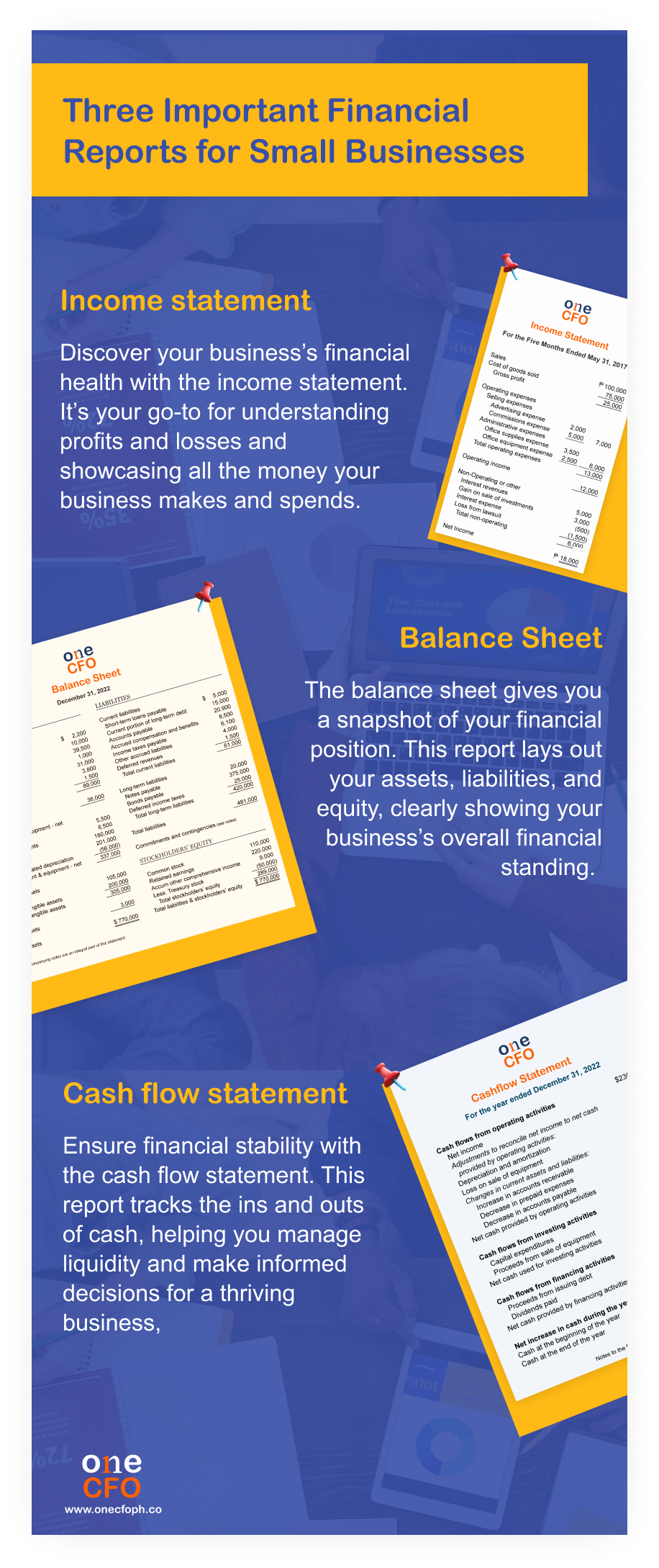
Income statement
The income statement, also called the profit and loss
statement, measures a company's
profitability. This financial report lists the business's sources of revenue, which
typically comes from sales.
Similarly, the income statement summarizes all company expenses, including the cost
of goods
sold (COGS), administrative and marketing fees, taxes, interests, and miscellaneous
expenses.
The end of the income statement shows the net income or bottom line, which comes from
deducting all expenses from the revenue. But, if the business's expenses exceed its revenue,
the income statement will show a net loss.
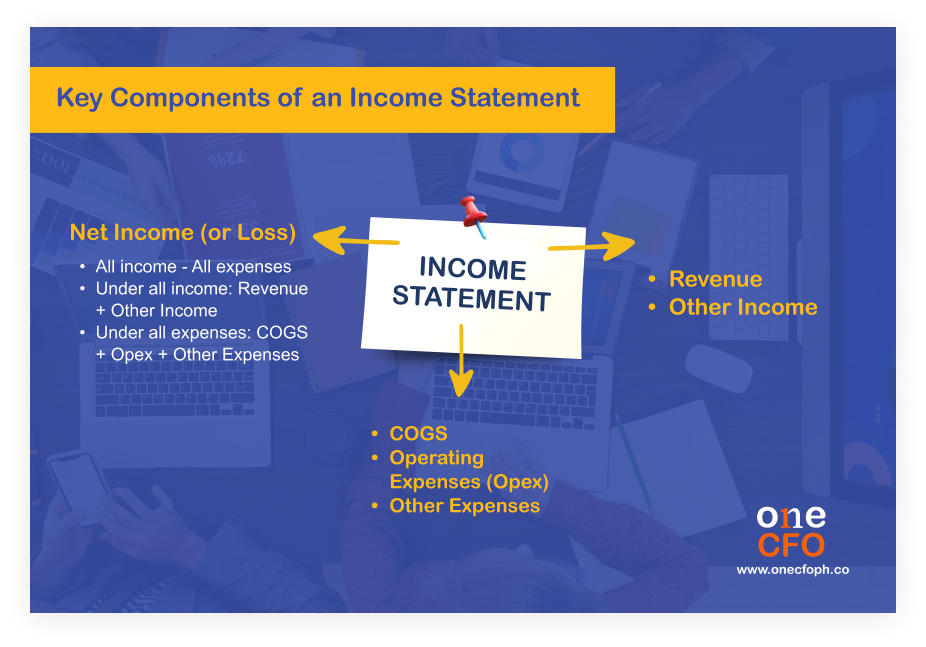
Balance Sheet
Another important financial statement to consider is the balance sheet. A balance sheet showcases the company’s financial position, typically during the end of the reporting period.
What is the purpose of a balance sheet?
Specifically, a balance sheet shows a business’s assets, liabilities, and shareholder’s equity:
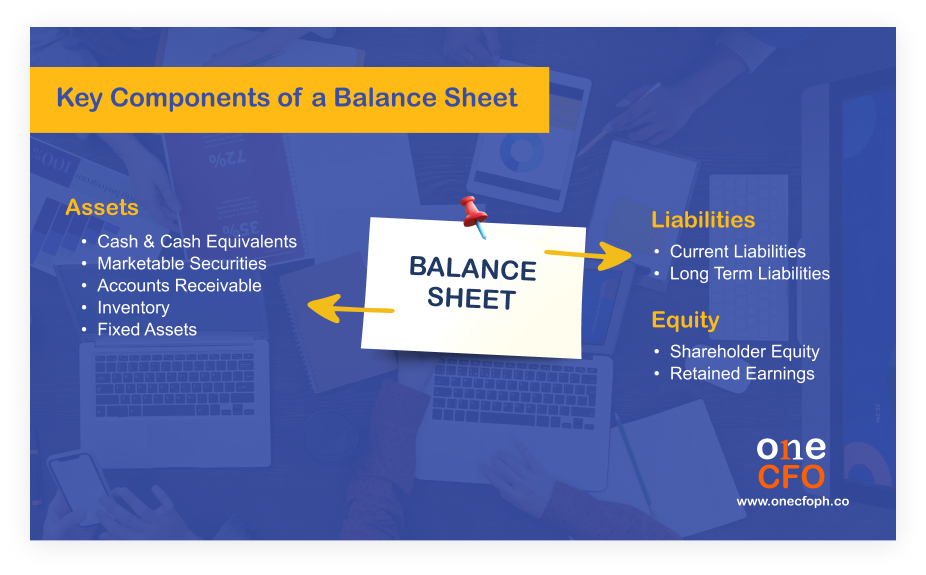
Cash flow statement
As given in the name, a cash flow statement summarizes all cash inflows and outflows the business had in a given period. This financial report represents a company's liquidity and how it manages its cash effectively.
Three components of a cash flow statement
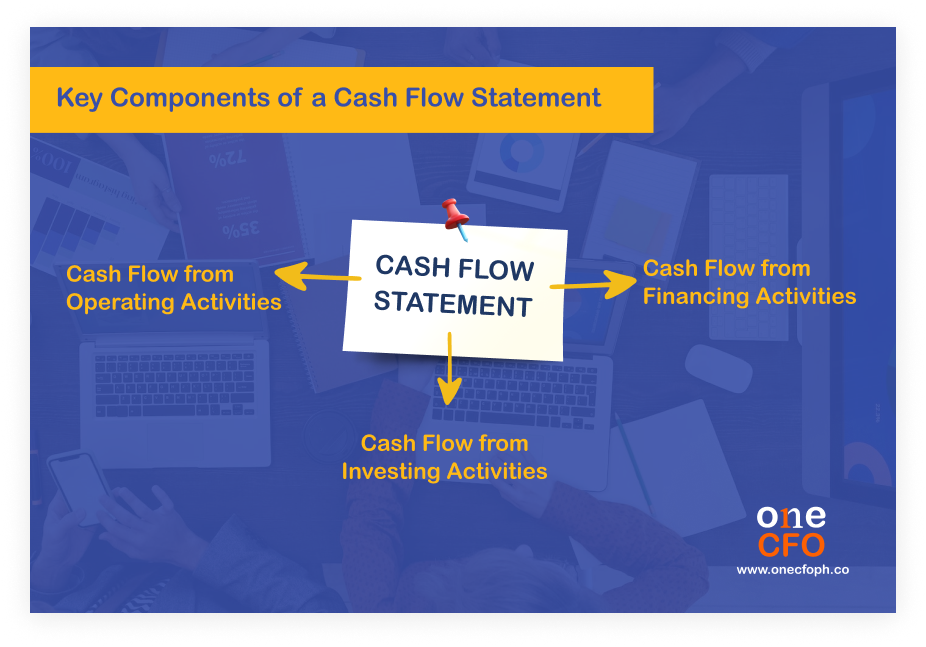
There are three components to a cash flow statement: operating, investing, and financing:
Dive into this video for a deeper understanding of the three components of a cash flow statement:
Why are financial reports important to small businesses?
Beyond being mere guides, financial reports provide owners and stakeholders with
indispensable insights into the financial health of their ventures.
These reports are not just about numbers on paper; they reveal the business's performance,
strengths, and areas for improvement.
Below are the core reasons financial reports play a pivotal role in steering small
businesses to make informed choices, spotting trends, and maintaining sound financial
health.
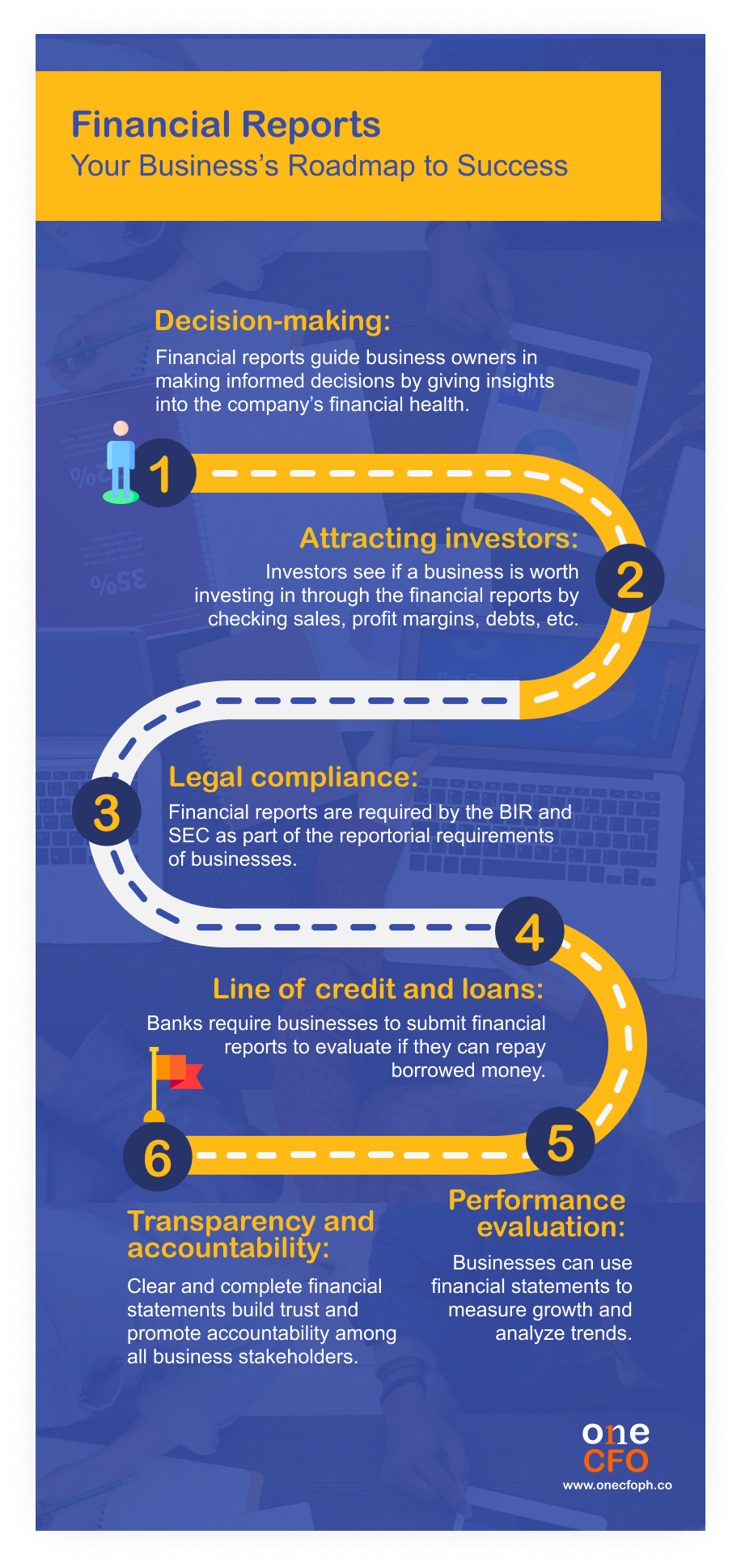
Decision-making
Financial reports are invaluable tools that enhance the decision-making process. They show
how well the company is doing financially and if it’s making money. With these reports,
businesses can make smart moves for success and growth.
Business owners use income statements to measure profitability. Since this report summarizes
the company’s revenue and expenses, the owners and management can review this to strategize
how to increase their net income or recover from a loss.
On the other hand, the balance sheet helps small business owners make informed choices about
investments, loans, and other strategic decisions. A well-balanced balance sheet ensures the
business is not overburdened with liabilities and has the necessary resources to support its
ongoing operations and obligations.
Entrepreneurs also need to make decisions for the year ahead. Cash flow statements
greatly
help project future inflows and outflows, which is crucial in proper budgeting and planning.
Attracting investors
When you raise funds or capital from
investors, your business’s financial statements become
vital. Financial statements reveal information about the company’s financial health, which
helps investors decide if they should give you any money.
Investors look at different financial metrics when assessing a company. But some of the most
basic ones they can quickly check from your reports are sales, profit margin, debt, and cash
flow.
Sales and profit margins are two essential metrics from the income statement. Many
businesses think of helpful products, but your sales define if people are willing to spend
for them.
Is your business worth the investment?
Additionally, investors also check if the business makes enough profit and if it can grow to
determine if they can get good returns on their investments.
Debt is also one of the things investors are wary about, especially since it can eat up on
the cash flow.
Businesses with high debt-to-equity ratios based on their
balance sheets
are riskier to
invest in. These companies may have reduced liquidity, as a significant portion of their
cash is committed to servicing debts, limiting their financial flexibility and increasing
susceptibility to financial challenges.
Legal compliance
Financial statements are not only for the benefit of your business but are also requirements
for legal compliance.
The Bureau of Internal Revenue (BIR) requires businesses earning gross sales of more than
₱3,000,000 to submit audited financial statements (AFS) along with the
annual income tax
return (ITR).
According to the Revised Corporation Code, corporations with total assets or liabilities of
₱600,000 or more must submit their AFS to the Securities and Exchange Commission (SEC).
Also, remember that the BIR should stamp the AFS before submitting it to the SEC.
On the other hand, corporations that don’t meet the ₱600k threshold by the SEC should still
submit annual financial statements, accompanied by a duly notarized Treasurer’s or Chief
Financial Officer Certification.
Are financial statements used for tax purposes?
Financial statements become strategic documents, reflecting past financial performance, and
are handy when filing taxes. The net income reported in the income statement forms the
foundation for accurate and compliant tax filings.
Additionally, the detailed breakdown of expenses helps businesses maximize tax deductions,
ensuring efficient financial management and regulatory adherence.
To discover insights on tax deductions and effective strategies for saving on taxes, check
out this video:
Line of credit and loans
For businesses, maintaining accurate and up-to-date financial statements is not just a
compliance requirement; it is a strategic imperative to foster trust with financial partners
and access the capital needed for growth
and operational needs.
Businesses can use their financial statements to see if they can take on more debts.
Comparing the current assets and liabilities and investigating the company’s cash flow will
give insights into how the business can manage its resources and settle its debts
efficiently.
What is the importance of financial statements to the banks?
Financial statements are paramount for banks and financial institutions when assessing the
creditworthiness of businesses seeking loans or lines of credit. These statements serve as a
comprehensive financial snapshot, offering insights into a company’s fiscal health,
stability, and performance over time.
Lenders scrutinize key components such as liquidity, profitability, and solvency to gauge
the business’s ability to meet its financial obligations. A robust set of financial
statements instills confidence in lenders and facilitates transparent and informed
decision-making.
Performance evaluation
Similar to how investors analyze financial statements to determine a company’s investment
potential, businesses can leverage these reports to gauge their growth and performance.
The data provided by the financial reports can be used to monitor how the business is
performing and lay the groundwork for informed decision-making.
4 KPIs to gauge small business performance
Identifying key performance indicators (KPIs) to
guide small businesses is crucial. These
metrics, extracted from the financial reports, show the business's performance, stability,
and potential.
The KPIs you monitor may be dependent on the nature of your business and performance
criteria, but here are the basics:
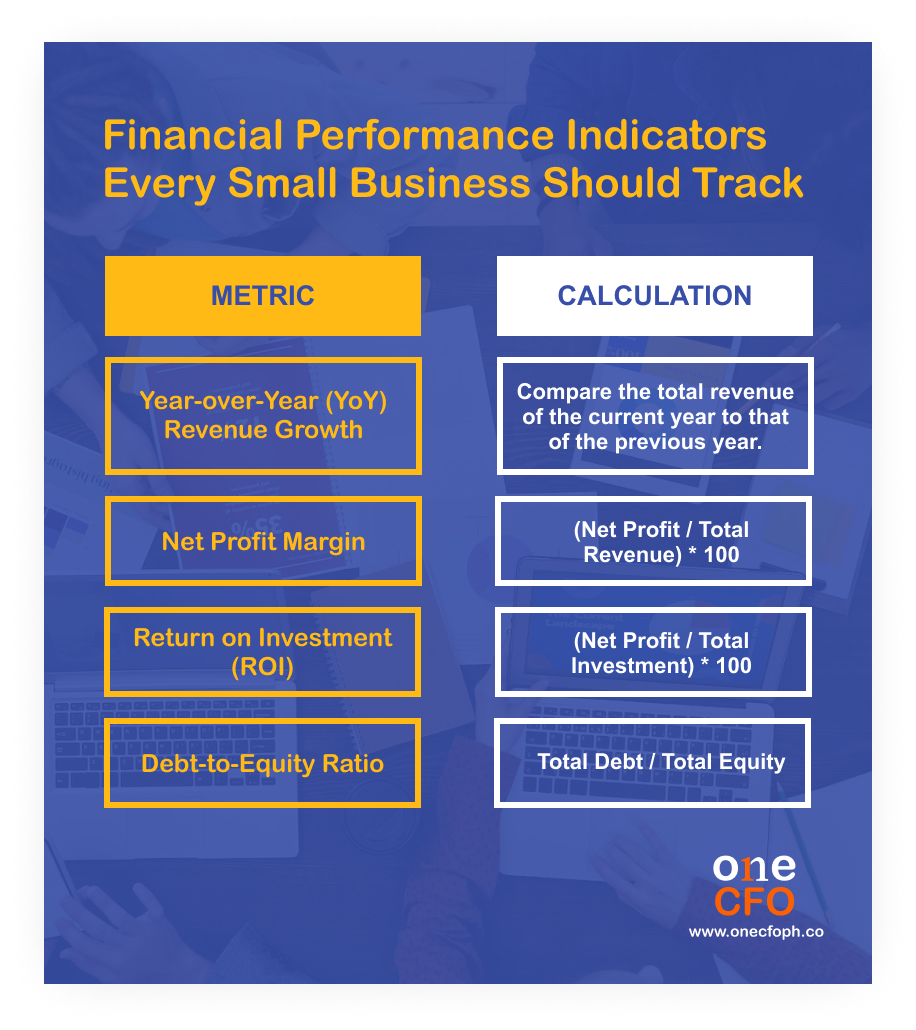
Transparency and accountability
Clear and comprehensive financial statements go beyond mere documentation. They play a
pivotal role in fostering transparency within the business and among external
stakeholders.
By meticulously reporting financial information, a company showcases its integrity, a
cornerstone in establishing and maintaining strong business connections.
Moreover, a company with complete financial reports shows it has nothing to hide, building
trust with its partners, investors, and employees.
Why is accountability important in financial management?
Financial statements go beyond numbers, serving as a critical tool in fostering
accountability within a business.
These statements offer a detailed insight into how a company manages its resources, handles
outstanding debts, allocates funds for current expenses, and plans for future investments.
In essence, financial statements serve as a tangible representation of the company’s
commitment to responsible financial management. This assures stakeholders of its dedication
to sound business practices and creates trust and belief in how the company manages its
money.
Unleash growth with strategic financial reporting
Financial reports, including income statements, balance sheets, and cash flow statements,
are indispensable tools for small businesses. They guide decision-making, assess
performance, and play a pivotal role in establishing connections that propel business
growth.
Recognizing the significance of these reports, entrusting finance experts like OneCFO is a
strategic business move!
OneCFO serves as your
all-in-one CFO, bookkeeping, and tax assistant. With our team of
finance and accounting professionals, we ensure that all your financial reports are
accurate, insightful, and consistently prepared on time.
Explore the possibilities with OneCFO by visiting us at onecfoph.co or
contacting us at [email protected]
Let’s elevate your financial reporting, setting the stage for your business success.
Read our disclaimer here.